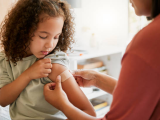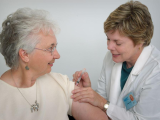Apr 24, 2007 (CIDRAP News) – In an effort to improve developing countries' access to potential pandemic influenza vaccines, the WHO (World Health Organization) said today it is awarding grants to six countries to help them develop the capacity to make flu vaccine.
The grants of up to $2.5 million each will go to three countries hit hard by H5N1 avian flu—Indonesia, Vietnam, and Thailand—plus Brazil, Mexico, and India, the WHO said. The money will come from $10 million supplied by the United States and $8 million from Japan.
The announcement comes on the eve of a WHO-sponsored conference on ways to provide developing countries with access to pandemic vaccines. The issue came to the fore in February, when Indonesia revealed it had stopped sending H5N1 virus samples to the WHO, in order to protest use of the samples by drug companies to make vaccines priced beyond the country's reach.
In late March, following a meeting with the WHO, Indonesia promised to resume sending the samples in return for a WHO pledge to develop new guidelines for sample sharing and an interim promise not to share samples with drug companies without the source country's approval. However, the WHO has not yet reported receiving any samples.
In announcing the grants today, Dr. David Heymann, the WHO's assistant director-general for communicable diseases, said, "It is imperative that the global community works collectively to ensure more equitable access to a vaccine and other health measures in the event of an influenza pandemic. We all have a responsibility to protect global health security."
With flu vaccine production facilities, countries will be equipped to protect their people from seasonal flu, said Dr. Marie-Paule Kieny, director of the WHO Initiative for Vaccine Research. And if a pandemic emerges, the facilities can be converted to make a vaccine based on the pandemic strain, she said.
It will take at least 3 to 5 years for the six countries to start producing vaccine, the WHO said. Until then, they will need help to ensure they can obtain vaccines.
The meeting scheduled tomorrow will include officials from countries with human H5N1 cases, donor countries, and vaccine manufacturers in developed and developing countries.
The WHO had announced Mar 22 that six projects to establish flu vaccine production facilities in developing countries were in the final approval stage, but the countries were not named at that point.
See also:
Mar 27 CIDRAP News story "WHO, Indonesia reach accord on virus sharing"




















